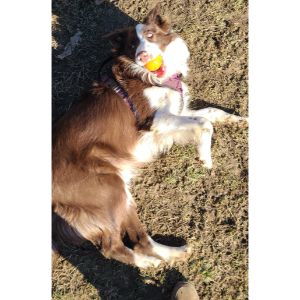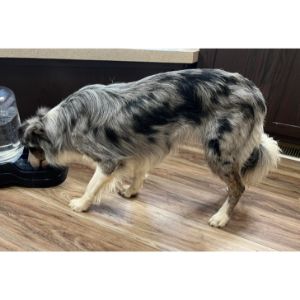
Raising a fat Border Collie is relatively effortless due to their tendency to gain weight. However, managing their obesity and preventing its potential consequences can prove to be a challenging task. So, are you ready to help your fat Border Collie?
Unfortunately, modern Border Collies are prone to weight gain despite their active lifestyle, which can lead to obesity if not addressed. Therefore, you should research and learn to recognize early signs of obesity and guidelines on maintaining healthy body weight in your Border Collie, such as choosing the right food and creating an exercise schedule.
Read on to learn more.
Before you scroll further down this guide, “Do You Have a Fat Border Collie,” check out these other Border Collie-related articles from our team at We Love Doodles: Popular Border Collie Mixed Breeds
Origins Of the Border Collie

Originating from the Scottish borders, the Border Collie is renowned for its intelligence, obedience, stamina, and exceptional herding skills, earning its title as the world’s most intelligent dog breed.
In addition to herding, they excel in canine sports, conformation shows, and search and rescue missions.
Is My Border Collie Overweight?

For Border Collies, obesity is the accumulation of body fat exceeding 20% of their normal, average body weight. Overweight and obese Border Collies tend to have substantial fat deposits in the neck, thorax, spine, base of the tail, and legs.
While not classified as a disease, obesity is a concerning issue that affects a quarter of the Border Collie population. Statistics indicate that 25% of Border Collies are either overweight or obese.
Why Is Obesity Dangerous?

Maintaining an average or lean weight in Border Collies, and in dogs in general, can lead to a longer and healthier life. Obesity can significantly reduce the quality of life and predispose them to several life-threatening conditions.
Fat Border Collies are at a higher risk of developing arthritis, diabetes, heart problems, and certain types of cancer.
Health Problems Caused by Obesity

Breeds like Border Collies that become overweight can experience strain on their backs and joints, leading to discomfort and difficulty walking or sitting. Similarly, brachycephalic species, such as Pugs, Boxers, and Bulldogs, have an increased risk of respiratory and breathing problems from being overweight.
Moreover, overweight and obese dogs are more likely to develop severe health issues, including diabetes, arthritis, high blood pressure, breathing problems, and cancer, which can ultimately reduce their life expectancy.
It is crucial to have your veterinarian frequently monitor your dog’s weight and health to ensure that they are losing weight and improving their overall well-being.
How To Recognize Obesity In Border Collies?

It can be challenging to spot gradual weight changes in your Border Collie when you see them every day. To make an objective assessment of your Border Collie’s body condition, consider the following factors:
Checking the Ribs
Begin by placing your hands on your Border Collie’s ribcage and spreading your fingers. You should be able to feel their ribs quickly. If you need to apply extra pressure to locate the ribs or cannot touch them, it may indicate that your Border Collie has excess fat covering them.
Checking Form Above

Another way to assess your Border Collie’s body condition is to observe them from above. A healthy Border Collie should have a well-differentiated waist when viewed from above, with the waistline narrowing behind the rib cage towards the hips.
If there is no waist or the core is not well-defined, it could be a sign of thick fat layer deposits.
Checking the Profile
A lean Border Collie will have a tucked-up belly behind the rib cage. However, if you notice a loose stomach hanging down, it may indicate that your Border Collie is overweight.
Dealing With Obesity

It is crucial for Collies to maintain their health and well-being. Addressing and managing the condition is essential if an underlying medical issue causes weight gain. However, if weight gain is due to poor dietary and exercise habits, you can follow several weight management tips to help your Border Collie maintain a healthy weight.
Dealing with Border Collie obesity requires a comprehensive diet and exercise management approach. Even small weight changes can significantly enhance their quality of life.
In addition, by adopting a healthy diet and exercise routine, avoiding overfeeding, and not giving too many treats, you can help your dog maintain a healthy weight and avoid potential health issues associated with obesity.
Here are some tips to help you manage your Border Collie’s weight:
Provide High-quality Dog Food
Like humans, dogs can gain weight by consuming excessive food and leading a sedentary lifestyle. Unfortunately, the consequences of obesity in dogs range from joint and respiratory issues to diabetes, high blood pressure, and cancer.
Therefore, monitoring your dog’s weight and consulting with a veterinarian before implementing any new diet or exercise plan is crucial.
One effective way to initiate your dog’s weight loss journey is by replacing his second meal with primarily green beans, a bit of kibble, and a doggie multi-vitamin.
In addition, cutting back on high-calorie treats and switching to healthier options such as fresh chopped vegetables or fruits can significantly reduce calorie intake without compromising taste. Moreover, if you give treats as rewards while training your dog, ensure that you balance the calorie count from their food allotment.
It’s essential to remember that overfeeding your dog with treats or food to the point of obesity is not an expression of love. On the contrary, it can have dire consequences for your dog’s health and lifespan.
Furthermore, please don’t rely solely on your dog’s voracious appetite to indicate his caloric needs. Many dogs will continue to eat even when they have met their daily requirements.
You can ensure that your dog lives a long, healthy, and happy life by implementing healthy food choices, regular exercise, and closely monitoring your dog’s weight and health.
Create a Strict Exercise Schedule

It’s essential to remember that every dog is different and has unique needs, so always consult your veterinarian before starting any new diet or exercise plan. In addition to the tips above, providing your dog with a safe and comfortable environment that encourages movement and activity is essential.
Consider providing your dog with toys and games that stimulate physical and mental activity, such as puzzle feeders or interactive toys.
Remember, your dog’s health and well-being are in your hands. By monitoring your dog’s weight, providing a healthy diet and exercise routine, and seeking veterinary care as needed, you can help your dog live a long and happy life.
With patience, dedication, and the right approach, you can help your overweight dog achieve a healthy weight and enjoy a more active and fulfilling life.
By following these tips and seeking the guidance of a professional if needed, you can help your fat Border Collie achieve a healthy weight and improve their overall quality of life.
FAQs About Obese Border Collie

There could be several reasons why your Border Collie is overweight or obese. One common cause is overfeeding or giving too many high-calorie treats. In addition, dogs needing more exercise or leading a sedentary lifestyle may also gain weight.
Other factors that could contribute to a fat Border Collie’s weight gain include certain medical conditions such as hypothyroidism, Cushing’s disease, or insulin resistance.
Identifying the underlying cause of your Border Collie’s weight gain is essential to develop an effective weight loss plan. A visit to your veterinarian can help rule out any underlying medical conditions and offer advice on appropriate dietary changes and exercise routines to help your Border Collie lose weight and maintain a healthy weight in the long run.
There is no specific maximum weight for a Border Collie as each dog is unique, and their weight can vary depending on their age, sex, and overall health. However, the average weight range for a Border Collie is between 30 to 55 pounds (14 to 25 kg) for males and 27 to 45 pounds (12 to 20 kg) for females.
Therefore, you must monitor your Border Collie’s weight regularly and consult a veterinarian if you notice any significant changes in their weight or body condition. Maintaining a healthy weight can help your Border Collie live a long and active life.
You can make a rough assessment by checking if you can feel your dog’s ribs quickly, if their waist is visible, and if their stomach tucks up behind the ribcage. If you cannot handle their ribs, they have no core, and their belly hangs low, your Border Collie may be overweight.
It’s best to consult with a veterinarian to determine your Border Collie’s ideal weight and receive guidance on managing their weight. Your veterinarian may recommend specific dietary changes and exercise routines to help your Border Collie achieve and maintain a healthy weight. Doing so can improve your Border Collie’s overall health and prevent weight-related health issues in the future.
There are several ways to determine if your dog is overweight:
Body Condition Score
Veterinarians use a body condition score (BCS) system to assess a dog’s weight. This score uses a scale of 1-9, with a score of 4-5 considered ideal. Your veterinarian can help you assess your dog’s body condition score.
Ribs
You should be able to feel your dog’s ribs with minimal pressure. If you can’t feel them, your dog is likely overweight.
Waistline
A dog’s waistline should be visible behind the rib cage. If the waist is not visible, your dog may be overweight.
Belly
An overweight dog will have a protruding abdomen.
Movement
Overweight dogs may move more slowly and have difficulty with physical activities. If you are concerned about your dog’s weight, it’s best to consult with a veterinarian. Your veterinarian can help determine your dog’s ideal weight and provide recommendations on diet and exercise. Maintaining a healthy weight can help prevent health problems and increase your dog’s lifespan.
Conclusion For “How Do I Help a Fat Border Collie Lose Weight”

Border Collies are an excellent and intelligent breed prone to weight gain and obesity. Fat Border Collies may be cute, but they are unhealthy. Obesity can cause significant health problems, including arthritis, diabetes, heart issues, and certain types of cancer, ultimately decreasing their lifespan.
Therefore, it is crucial to maintain a healthy weight for your Border Collie through proper nutrition and exercise. Additionally, if an underlying medical condition causes weight gain, addressing the issue through appropriate treatment is essential.
If you find this guide, “Do You Have a Fat Border Collie,” helpful, you can check out these other dog-related articles from our team:
- Best Dog Toys to Keep Them Busy
- What is a Good Weight for a Fat Goldendoodle?
- How Do I Help a Fat Poodle Lose Weight?
You can learn more about the Border Collie dog breed by watching “Border Collie Dogs 101: Everything You Need To Know – Is It the Right Dog for You?” down below:
Garrett loves animals and is a huge advocate for all Doodle dog breeds. He owns his own Goldendoodle named Kona. In addition, he volunteers at the Humane Society of Silicon Valley, where he fosters dogs and helps animals. Garrett enjoys writing about Doodles and believes that dogs can teach humans more about how to live than humans can teach a dog.
Why Trust We Love Doodles?
At We Love Doodles, we’re a team of writers, veterinarians, and puppy trainers that love dogs. Our team of qualified experts researches and provides reliable information on a wide range of dog topics. Our reviews are based on customer feedback, hands-on testing, and in-depth analysis. We are fully transparent and honest to our community of dog owners and future owners.